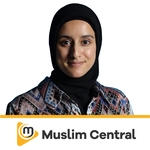Tesneem Alkiek – Inspirational Muslim Women #10 Hawa Aden Mohamed

AI: Summary ©
The speaker discusses the achievements of Hawa Adin Muhammad, a female Muslim woman who was born in Maf and moved to Canada after the civil war. She was forced to take a close look at her past and began a school for 120 girls, eventually leading to her own success. Hawa recognized the danger and labels it as a culture of harm, but pushed herself forward and took advantage of the opportunities to educate others. She was recognized for her accomplishments and was awarded the Janetta Sagan award in 2005, and she was also awarded the $10,000 prize for educating girls in her community.
AI: Summary ©
Salaam Alaikum, and welcome back to another episode
of Sayyiddehji,
where we discuss the achievements of some incredible
Muslim woman throughout history.
Today I want to talk about a female
leader who is alive and well and still
working hard in her late sixties to make
a difference in the world.
Hawa Adin Muhammad was born in Somalia but
moved to Canada later in her life after
the civil war in Somalia erupted
she lost her mother as a child and
as a result was left to take care
of a lot of domestic responsibilities as a
young girl.
Her schooling was often disrupted, but when she
was about 14 years old, she finally had
the opportunity to attend school regularly
and because of the many gaps in the
education she underwent beforehand,
she was able to truly appreciate the opportunity
for gaining knowledge. At the age of 8
years old, Howell received an FGM procedure.
Now for those of you who are not
familiar with FGM. It refers to female genital
mutilation. A cultural practice that normalize the cutting
or removal of female genitalia.
Controversy of this procedure aside, it's pretty obvious
from the description alone that this widespread practice
is not only dangerous but long.
When how was older sister underwent the procedure
at the age of 7, she passed away
following infections.
One of the most unfortunate issues of this
procedure
is that it is often invoked and legitimized
as necessary in the in the name of
Islam.
However, knew that as she got older FGM
had no place in Islam.
And her own experiences personally and that of
her late sisters
allowed her to recognize the countless disastrous side
effects of this procedure.
She eventually took it upon herself to make
a difference in this affair, and she dedicated
herself to both the protection of women's rights
and to put an end to FGM in
Somalia.
Ita Litchdar goes into great detail depicting the
life of Hawa. She mentions that despite that
Hawa fled to Canada after the civil war,
she returned to Somalia to start the Juba
Women's Development Center in Kismayo, a port town
devastated by war and teeming with thousands of
refugees, mainly women and children.
Later in her life in 1999,
she established a girls school since most girls
in Somalia couldn't afford to go to school.
As a result of all of her efforts,
Hau and her colleagues at times were accused
of being traitors to Somali culture and to
Islam and at other times were threatened physically.
But that didn't stop her and she started
the school for 120 girls. She said that
in the beginning we had no facilities and
the girls had to sit on the floor
but eventually they received funding from various NGOs.
Today, the school is attended by hundreds of
girls and even offers a part time program
in the afternoon for those who can't attend
full time. Hawa's also built a hostel and
orphanage for refugee school girls. At these educational
spaces apart from receiving a general education,
girls learn about the dangers and mythology of
FGM as well as human rights, women's rights,
leadership and how they can contribute to peace
and rebuilding in Somalia.
Among the handful of awards how was received
is the amnesty international Janetta Sagan award in
2005.
The prize recognized her outstanding achievements in defending
the rights of women and children often at
considerable risk.
The $10,000 prize that she received with this
reward was donated to complete a women's and
girls hospital This is only part of the
story of Hawa Muhammed's achievements
Here's a life of a girl who lost
her mother at a young age and endured
much hardship as a result.
But despite her trials, she pushed herself forward
and took advantage of the education she had
to make a difference in her society.
Hawa recognized what was wrong and what was
inappropriately attributed to ispam
and she refused to sit still as she
watch a practice continue throughout her community that
promoted harm in the name of her religion.
She pushed and pushed
despite the accusations and threats hurled at her
until she managed to directly educate hundreds of
girls who will all eventually pay it forward
for their own generation one day inshallah. Be
the however of your community
Be wary of the injustices
happening in your own community and don't stay
silent.
Raise your voice against immoral practices and then
physically contribute to any project you can that
will help alleviate that issue.
If it's a societal problem that's bigger than
you, remember remember hawa, an entire culture she
had to stand up against when it came
to one practice that was harmful.
And gather those around you, your classmates and
colleagues,
community members and siblings
and encourage them to join you in your
cause to make a difference.
I hope you are inspired by Hawa story
and I hope that it's a reminder of
our individual responsibility
in fighting injustice in our communities.
May Allah subhanahu wa ta'ala continue to grant
Hawa strength and resilience in our efforts and
may we be inspired to contribute to our
society through her footsteps. Amin. Gizakumullah Khayyun Wasalamu
alikumahu